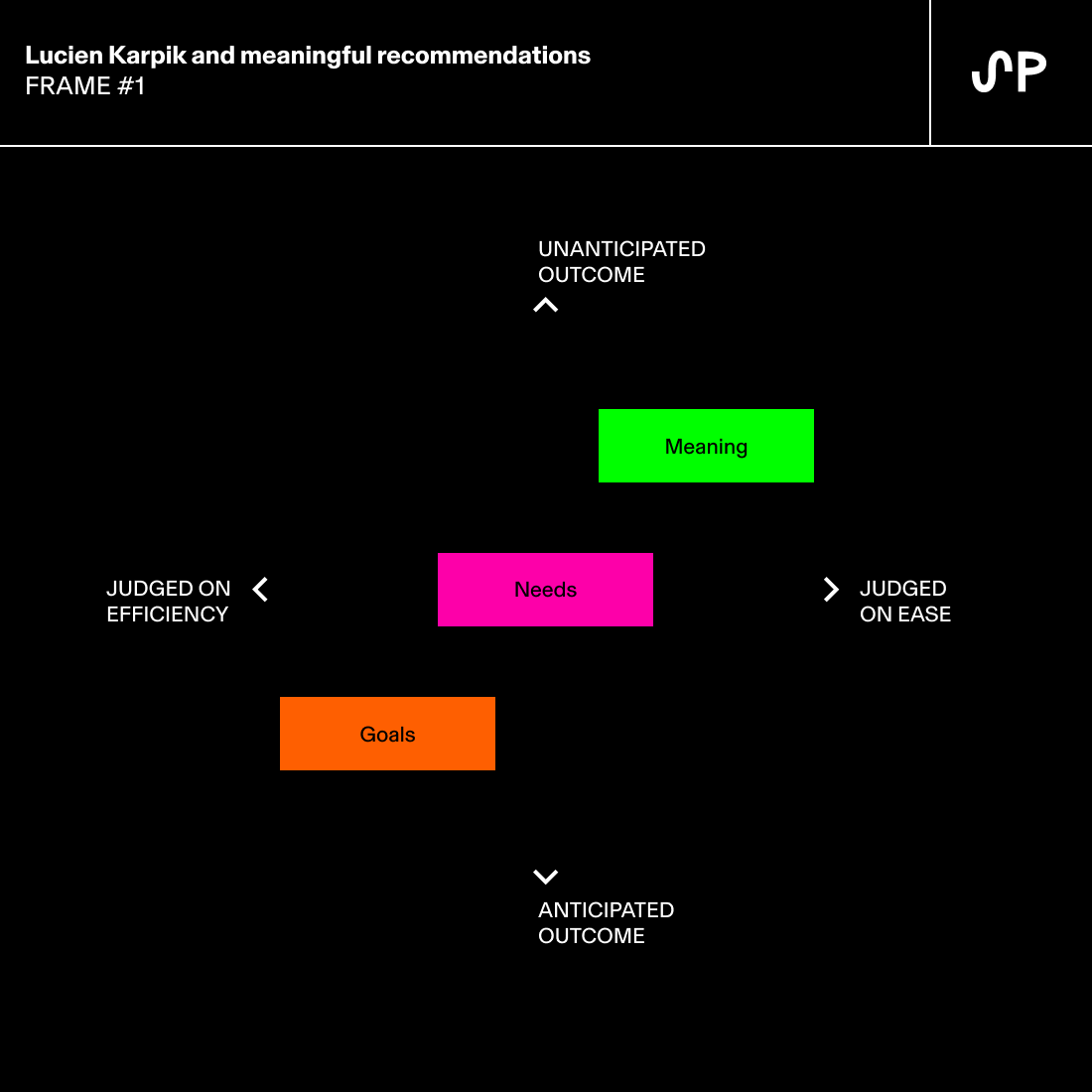This month's Frame: Lucien Karpik and meaningful recommendations
Welcome to Frames by Stripe Partners.
We’re switching from a quarterly to a monthly rhythm for our newsletter. If you’re a previous subscriber to our newsletter, we’ve transferred your contact details over from Mailchimp. If you’re new, welcome. We hope you enjoy a fresh format and a new focus to these mails. If you’d rather not receive them please feel free to unsubscribe below.
In our first edition, we're sharing a framework inspired by economic sociologist Lucien Karpik. It will help you see the limitations of “Jobs to Be Done” thinking and consider the deeper value that products and services can deliver to their users.
Recommendation matters
31% of ecommerce is now driven by automated recommendation. Netflix claims that 75% of what people watch on its platform stems from personalised suggestions (Michael Schrage, “Recommendation Engines”, 2020).
The impact of recommendation extends beyond consumer choices. Suggestions are shaping the way we understand ourselves. There is evidence to suggest that TikTok is predicting sexuality and conditions such as ADHD in advance of the individual themselves. By informing self-discovery, self-awareness and self-knowledge, the future of recommendation systems is also “the future of the self”.
The limitations of need-based recommendations
Several years ago Spotify made a bet that the future of recommendation would be algorithmic. As machine learning improves, the role of human editors will gradually recede as predictive systems become smarter. Central to this bet was a belief that it is possible to accurately map the musical needs of users. In essence, good recommendation maps content to need.
The key issue is that, while music may serve needs such as focusing or working out, needs are not the real reason why users connect with music and artists. People love a band or a musician because they have become meaningful to them.
Drake’s music may help people relax, or provide a solid tempo for their workout. But that’s not why they love Drake and his music. They love Drake because he has become meaningful to them.
The framework
Economic sociologist Lucien Karpik calls cultural goods like music, wine, novels and movies “singularities”. Singularities are complex, multidimensional goods, the value of which can’t be reduced to their specific features. It would be foolish to claim one song has more value because it is longer or because the singer hits higher notes. Or that a glass of red wine should be more expensive because it is a darker hue. Focusing on features in isolation misses the point.
In these complex markets, expert and/or common opinion replaces the comparison of features. We rely on the movie critic or wine connoisseur to tell us what to expect. Or use popularity (charts, social recommendation) as a proxy for value.
But the true meaning of these goods only emerges to the user when they experience it themselves. Unlike user needs or goals, meaning can’t be fully anticipated in advance. And two users may derive entirely different sorts of value from the same good. For example, one person could connect to a song because it soundtracked a breakup. Someone else could love the same song because it gets people dancing.
Using the framework
Spotify has found the concept of “cues” useful for thinking about how to trigger more meaningful experiences for their users. Cues are the way the music is automatically packaged and presented to the individual user, so that the content is more likely to trigger meaning that is relevant for them, without Spotify necessarily knowing what that meaning is.
The key to utilising meaning is to identify it without trying to understand it. Look for signals that suggest users are getting real value and then optimise experiences so they are more likely to trigger those types of outcomes. Sometimes “why?” is not the right question.
To read more about how Spotify is applying the framework see our EPIC case study "Beyond User Needs".
News
We’ve changed our visual identity and redesigned our website.
This reflects our continued growth, a new proposition and our focus on supporting technology-led businesses invent better futures. The new website showcases our writing, a focus mirrored in our shift to a monthly newsletter which provides subscribers with perspectives they can employ in their product, business and innovation strategy efforts.
Join us for our upcoming webinar “Privacy: a new segmentation to drive your data strategy” on Wednesday 15 September at 4pm BST.
The webinar will deep dive into the results of an attitudinal and behavioural segmentation survey conducted in the UK in May 2021. We will deconstruct the different attitudes towards privacy and provide guidance for brands and tech companies so they can design experiences adapted to different user privacy archetypes.
To sign up, visit our Eventbrite page here.
Here's more on why we think data privacy is such a critical issue to get right.




